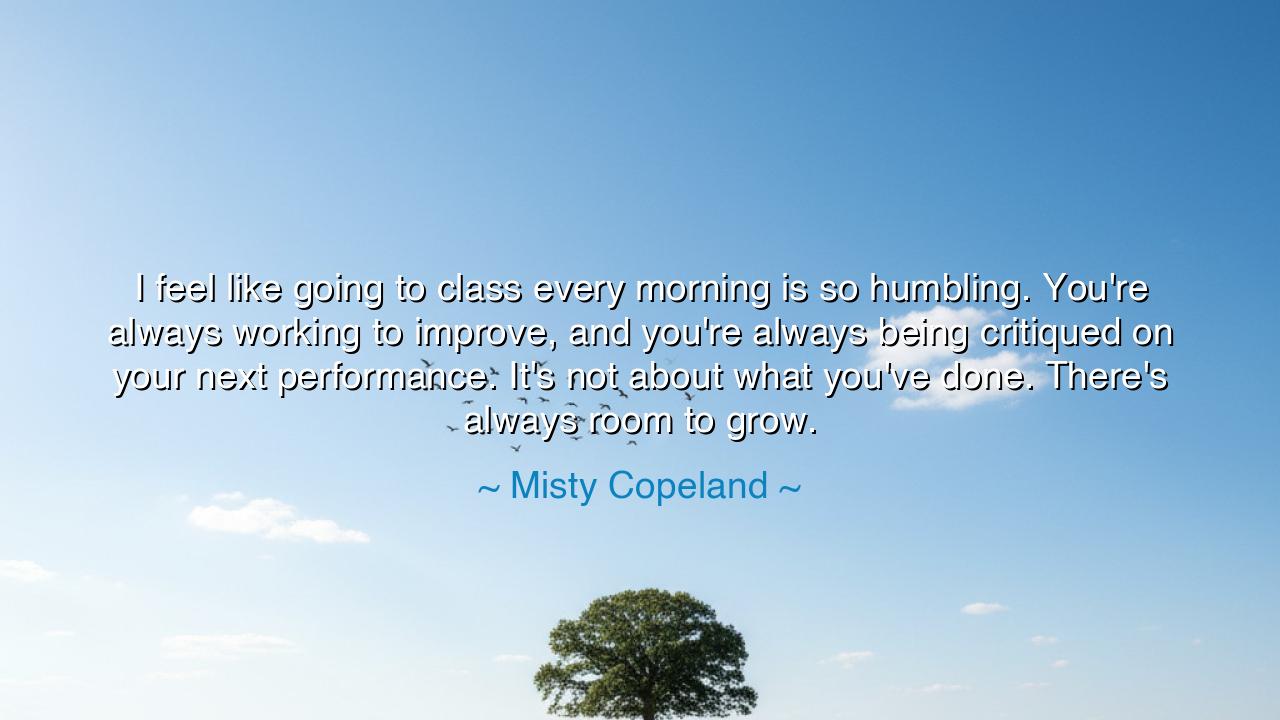
I feel like going to class every morning is so humbling. You're
I feel like going to class every morning is so humbling. You're always working to improve, and you're always being critiqued on your next performance. It's not about what you've done. There's always room to grow.






Misty Copeland, a dancer whose name has become a symbol of grace and perseverance, once declared: “I feel like going to class every morning is so humbling. You’re always working to improve, and you’re always being critiqued on your next performance. It’s not about what you’ve done. There’s always room to grow.” These words are not merely about the art of ballet but about the eternal rhythm of life itself. They remind us that the pursuit of mastery is never complete, and that humility is the true companion of greatness.
The origin of this truth lies in the ancient disciplines of training and self-cultivation. In the temples of Greece, athletes rose at dawn to run, wrestle, and train, not for glory already won but for victories yet to be achieved. In the dojos of Japan, samurai practiced their sword forms tirelessly, knowing that even a single lapse could mean defeat. Likewise, Copeland speaks of her daily return to class as a sacred ritual, where the body is honed and the spirit disciplined. The morning becomes not just a time of day but a symbol of renewal, of beginning again despite yesterday’s triumphs or failures.
There is a deep humility in her reflection. She acknowledges that no matter how far one has risen—no matter how many roles she has danced, how many accolades she has received—there is still the stern hand of the teacher, the watchful eye of critique, the reminder that perfection is not yet reached. This humility is the mark of true greatness. For the one who believes he has already arrived stagnates, while the one who knows he must continue to improve ascends ever higher.
Consider the example of the Roman general Scipio Africanus. After defeating Hannibal and securing Rome’s glory, he continued to study strategy and philosophy, refusing to rest upon his laurels. He understood, as Copeland does, that “It’s not about what you’ve done.” Past victories fade; only the willingness to learn ensures lasting strength. This is why the ancients revered the humble learner more than the boastful victor. For the learner’s path is endless, and in endlessness lies immortality.
The emotional power of Copeland’s words lies in their defiance of pride. In a world eager to praise achievement, she turns our gaze toward the unseen discipline behind the stage—the sweat of the studio, the vulnerability of being critiqued, the humility of standing each day before the mirror of one’s own imperfection. Her truth is not that greatness is inherited or bestowed, but that it is forged daily in the fire of repetition and correction.
The lesson is timeless: there is always room to grow. No matter your craft, no matter your stage in life, do not believe your journey is complete. Treat each day as a new class, each challenge as an opportunity for refinement. Do not cling too tightly to past accomplishments, for they are stepping stones, not resting places. The ancients knew that the mountain of mastery has no summit, only higher paths yet to be walked.
Practical action flows from this wisdom: seek out critique instead of fleeing it. Welcome correction as the friend of progress, not the enemy of pride. Each morning, dedicate yourself to one small act of improvement, whether in body, mind, or spirit. Accept that growth is often uncomfortable, for only through discomfort do we rise beyond what we were yesterday.
Thus, Misty Copeland’s words become not just the reflection of a dancer but a teaching for all humanity. “You’re always working to improve… there’s always room to grow.” Let this truth be engraved in the hearts of future generations: that humility is the root of greatness, and daily dedication is the path to immortality. For the soul that never ceases to learn, like the dancer who greets the studio each dawn, will forever ascend in grace and strength.






AAdministratorAdministrator
Welcome, honored guests. Please leave a comment, we will respond soon